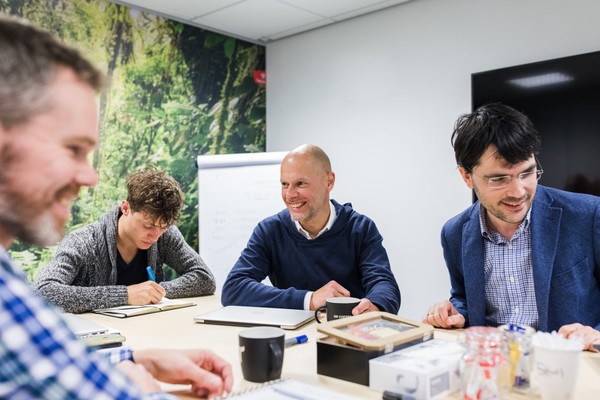Next Icons | How to become a game changer: with Sjef Peeraer & Edwin Vlieg

You have entrepreneurs, and then you have game changers. That's the difference between those who run a business and those who push boundaries and make the world a better place. The question is: how do you evolve into a game changer as an entrepreneur? To find out the answer to this question, we sat down with an established name and an emerging trailblazer: Sjef Peeraer, founder of Budget Energie and Positron Ventures, and Edwin Vlieg of Moneybird.
This story was previously published in the Next Icons Magazine. You can read the entire magazine here.
To get straight to the point: what do you think it takes to be a game changer?
Sjef: "You could, of course, write entire books about this. In any case, it all starts with a strong, sometimes contradictory vision and mission about how something could be different and better. People who do something groundbreaking usually have strong opinions and are sometimes a little eccentric. Take Elon Musk, for example. This can occasionally create issues: at the end of the day, you need to be able to articulate your mission and vision and get and keep people on board. After all, although it might be perfectly clear to you as an entrepreneur what your direction is, you also have to get people to buy into your story. You need people who believe in your vision and mission and with extensive knowledge of the sector you're operating in. A fairly radical vision will mean you attract exceptional, adventurous people, which is just what you need. Then it's about keeping everyone on track, making sure everybody continues to like each other and ensuring your bank account stays in the black."
Edwin: "In my opinion, the people around you certainly play a major role in becoming a game changer. When we started out, we mainly worked together as friends, a bit like a fraternity. Once new colleagues came on board, we got especially excited that people were coming to help us. That's what it felt like. This also created a great culture at our company, which I increasingly realize is quite unique. But to become a game changer, you need more than a team that's putting its shoulders to the wheel and doing great things. You also need to listen to your customer and find out where the opportunities lie. After that, though, it's up to you to decide what you put your energy into and what you leave behind."
Sjef: "This last point is essential. Just listening to your customer won't get you there. After all, customers don't always know exactly what they need either. Which means you won't ever get that unique vision from customer research. Although your customers' feedback can give you direction, real game changers only make an impact with their own innovative ideas."
So unique ideas are important. So, is innovation indispensable to becoming a game changer?
Edwin: "We don't innovate for innovation's sake. We mainly look at what the next step is. This might occasionally involve a very innovative step, but it could also be a very boring one. In the past year, in collaboration with Adyen, we saw to it that our customers got a Moneybird debit card and accompanying account in addition to our accounting software. This wasn't yet on the market, so in that sense it was innovative. As long as it has a purpose and contributes something."
Sjef: "That it contributes something is the most important thing. I strongly believe that part of the problems we face as a society should be solved with technology. This does require continuous innovation; otherwise we aren't going to be able to solve existing environmental and health challenges. Besides, innovation drives our prosperity. I don't believe in degrowth, but in clean growth through innovation."
Does the right timing for such innovations make any difference, or is that just a myth?
Sjef: “Timing does matter. I have unfortunately been too early on a couple of occasions. Sometimes you see something coming down the line but act on it too early. Whether that can really be prevented, I don't know, but I do know that you have to continue troubleshooting. After all, waiting isn't an option for entrepreneurs."
Edwin: “When I look at Moneybird, timing certainly plays a role. When we started out, accounting was becoming increasingly digital, which was a good time for us to start out. But we hadn't been able to roll out the proprietary checking account back then, because the technology wasn't ready for it. Now, other parties have cleared the way for us, and we can continue to develop our own business with these building blocks. Which is partly timing, and partly luck."
Sjef: “I agree, that something works out is often down to a lot of luck. And if you aren't lucky in terms of the timing, then the key to success is to keep trying and make timely adjustments when things don't appear to be working out."
Is this also advice you want to give Next Icons on their way to becoming game changers?
Sjef: “Yeah, hang in there. I think entrepreneurs are, by nature, optimistic; otherwise you don't start up something. And I myself have always been too optimistic when it comes to how long it takes to realize something or about what problems you encounter along the way. Emotionally, that can be difficult. When you're experiencing such setbacks, you need to realize that it's harder than you initially expected, and that if it were easy, everyone would be doing it. And then, just like that, success can come from unexpected quarters. This happened to me with Atoomstroom. Although, in terms of vision, it could have been a success, the nuclear disaster in Japan threw a spanner in the works. You can then choose to throw in the towel or look for new solutions. This spanner in the works at Atoomstroom ultimately led to the success of Budget Energie. I didn't see that coming beforehand. And so many startups become successful in a different way than they had imagined. So hang in there, especially when the going gets tough."
Edwin: “My advice would primarily be to be on the lookout for those clutch moments. For techies, it can be very tempting to get bogged down in technology. After all, there is always room for improvement. But you won't make an impact that way. So make sure that you also enter the market at a certain point in that early phase. Launch it, even if you don't think it's perfect yet. Another person might not see your flaws at all. And if they do, you'll be getting valuable feedback from your customers. You can then build on that. So get your head out of the clouds, and go ahead and do it!"
____________________________________
About Sjef Peeraer
Joseph (Sjef) Peeraer refers to himself an ‘entrepreneur turned tech investor’. After running a number of startups, he started Atoomstroom in 2008, an energy supplier providing 100% nuclear energy. In doing so, he wanted to shake up the energy market; after all, "if CO2 was one of the world's biggest problems, we couldn't just push nuclear energy aside," says Sjef. Things were going well until the explosion of the nuclear power plants in Fukushima in 2011. Although the nuclear energy market collapsed as a result, this did unlock the door to new success: Budget Energie. It is now the fourth largest energy supplier in the Netherlands, with more than one million customers. In 2019, he took a step back and resigned as CEO. He subsequently used the proceeds to found Positron Ventures: a fund for science entrepreneurs looking to introduce their socially relevant technology to the market through startups.
About Edwin Vlieg
Edwin Vlieg studied computer science at the University of Twente. He and his fellow students Joost Diepenmaat and Berend van Bruijnsvoort noticed that the invoicing tasks of their small companies were always low on their to do list. Like true IT professionals, they set to work to build a solution. The result was a program that allowed them to create invoices. This caught on, and they soon expanded to processing receipts, sending reminders, and preparing quotations. That's how Moneybird came about: a complete accounting package. And this package continues to grow, with Moneybird recently adding the option of its own linked checking account with debit card. The ultimate goal is that entrepreneurs can fully focus on doing business and not have to worry about financial administration.






